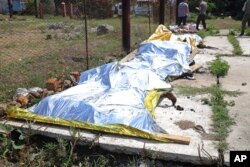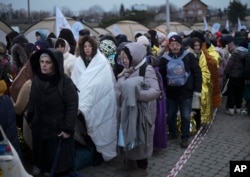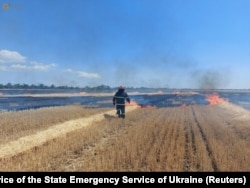For full coverage of the crisis in Ukraine, visit Flashpoint Ukraine.
The latest developments in the conflict between Russia and Ukraine. All times EDT.
9:15 p.m.: The Ukrainian Mission to the European Union estimates Russian losses since the invasion.
8 p.m.: OPEC's new secretary general said that Russia's membership in OPEC+ is vital for the success of the agreement, Kuwait's Alrai newspaper reported on Sunday, quoting an exclusive interview with Haitham al-Ghais, Reuters reported.
OPEC+ is an alliance of the Organization of the Petroleum Exporting Countries (OPEC) and allies led by Russia.
Al-Ghais, Kuwait's former OPEC governor, will head his first OPEC+ meeting on August 3, in which the group will consider keeping oil output unchanged for September, despite calls from the United States for more supply.
7:10 p.m.: Oleksiy Vadaturskyi was an agriculture tycoon, yes, but also one of his most celebrated ideas was to bring watermelons by boat from Kherson to Kyiv in summer.
The shipment became a symbol of summer among Ukrainians.
6:12 p.m.: Well-known post-Soviet reformer Anatoly Chubais, who left Russia following the Kremlin invasion of Ukraine, is reported to be in intensive care in a European hospital, Radio Free Europe/Radio Liberty reported.
Russian TV personality Ksenia Sobchak, a friend of Chubais, wrote on Telegram on July 31 that she had spoken with Chubais's wife, Avdotya, and that he was suffering from Guillain-Barre syndrome. She did not say where he was being treated.
Chubais's state of health or whereabouts could not immediately be confirmed by news agencies.
Before leaving Russia in March, Chubais resigned his position as Russian President Vladimir Putin's envoy for stable development, without giving a reason for doing so.
Many observers speculated that it could signal the highest-profile protest inside the Kremlin against Moscow's unprovoked invasion of Ukraine.
5:13 p.m.: Ukraine's defense elicits words of admiration at the Pentagon.
4:21 p.m.: The city of Berlin started switching off spotlights illuminating its historic monuments as part of a national effort to save energy in the face of Russian gas shortages, Agence France-Presse reported.
Some 200 buildings and landmarks including Berlin's red-brick city hall, State Opera House and Charlottenburg Palace will fall dark at night, officials in the German capital said this week.
"Given the war against Ukraine and the energy policy threats by Russia, it's important that we be as careful as possible with our energy," the city's chief official for the environment, Bettina Jarasch, said on Wednesday.
The policy affected six monuments from Wednesday night and will eventually encompass 200 buildings and landmarks along with their 1,400 spotlights over the next four weeks, Jarasch's office said.
3:40 p.m.: Many Ukrainians are defying Russia by striving to go back to normal despite being close to the front lines of the war. As CNN reports, simply continuing to live as normal a life as possible is the biggest victory there is against uncertainty.
2:13 p.m.: Relatives of Ukrainian prisoners of war at Olenivka prison in eastern Ukraine say they are determined to make sure the government and the international community do not forget about them. On July 29, dozens of Ukrainian POWs were killed in a blast at the prison that Russia and Ukraine have each blamed on the other. Radio Free Europe/Radio Liberty has the story.
1:52 p.m.:
1:01 p.m.: The International Committee of the Red Cross (ICRC) said it had not yet received permission to visit the Olenivka prison in eastern Ukraine, according to a statement issued on July 31.
The ICRC has condemned the July 29 prison attack which killed at least 53 Ukrainian prisoners of war in an area controlled by Russia-backed separatists.
Both the ICRC and the United Nations are seeking access to the site and the opportunity to evacuate the wounded.
“Families must receive urgent news of and answers on what happened to their loved ones,” the ICRC said.
Russia's Defense Ministry has invited the ICRC and UN to conduct an investigation at the prison.
While demanding an impartial probe be conducted, the ICRC said “it is not the role or mandate of the ICRC to carry out public investigations into alleged war crimes."
Kyiv and Moscow have traded accusations over who is to blame for the attack.
12:14 p.m.: Polish border authorities have said that 5.15 million people have fled Ukraine to Poland since Russia's invasion began on February 24, reported
Radio Free Europe/Radio Liberty.
During the same period, 3.25 million Ukrainians have returned to their home country, officials said on July 31.
On July 30, the number crossing the border into Poland was 25,400, while 29,900 made the trip from Poland back to Ukraine, officials added.
Poland has taken the bulk of refugees fleeing Ukraine, but other nearby countries have also accepted large numbers of people.
According to the U.N. refugee agency, more than 6 million people have been recorded as refugees across Europe since the start of the war.
Poland currently hosts more than 1.2 million. Germany has taken in 670,000, while the Czech Republic is sheltering more than 400,000, according to the latest U.N. data.
11:09 a.m.: Ukraine's president said on Sunday that the country's harvest could be half its usual amount this year due to the Russian invasion of Ukraine.
"Ukrainian harvest this year is under the threat to be twice less," suggesting half as much as usual, President Volodymyr Zelenskyy wrote in English on Twitter.
"Our main goal — to prevent global food crisis caused by Russian invasion. Still grains find a way to be delivered alternatively," he added.
Ukraine, a key global supplier of grains, has struggled to get its product to buyers due to a Russian naval blockade of Ukraine's Black Sea ports.
An agreement signed under the stewardship of the U.N. and Turkey on July 22 provides for safe passage for ships carrying grain out of three southern Ukrainian ports.
10:38 a.m.: The possibility of the first grain exporting ship to leave Ukraine's southern ports on Monday is high, a spokesperson for Turkey’s president said on Sunday.
"If all [details] are completed by tomorrow, it seems there is a high possibility that the first ship will leave the ports tomorrow,” said Ibrahim Kalin during an interview. “We will see ships leaving the ports the next day at the latest.”
He said the joint coordination center in Istanbul will probably complete the final work on the exporting routes very soon.
Russia and Ukraine are major global wheat suppliers. The U.N.-brokered agreement they signed in Istanbul last week aims to allow safe passage for grain shipments. The agreement aims to ease the world’s food crisis and reduce grain prices that have risen since the Russian invasion of Ukraine.
10:00 a.m.: An adviser to President Volodymyr Zelenskyy, said Sunday on Twitter that images of a prison in Olenivka in eastern Ukraine indicated the blast came from inside the building, which is under Russian control. At least 53 Ukrainian prisoners of war were killed during the explosion on Friday.
Mykhailo Podolyak said satellite photos and the lack of damage to adjacent structures showed the building was not attacked from the air or by artillery. He contended the evidence was consistent with a hyperbaric bomb set off inside.
The images, taken before and after the attack, show that a small, squarish building in the middle of the Olenivka prison complex was demolished with its roof in splinters.
Russian officials have claimed the building was attacked by Ukraine with the aim of silencing POWs who might be giving information about Ukrainian military operations. Ukraine has vehemently denied the allegations.
9:05 a.m.: President Vladimir Putin on Sunday signed a new naval doctrine which outlined Russia's global maritime ambitions, Reuters reported.
Putin signed the 55-page doctrine on Russia’s Navy Day. It sets out the broad strategic aims of Russia's navy, including its ambitions as a "great maritime power" which extend over the entire world. The main threat to Russia, the doctrine says, is "the strategic policy of the USA to dominate the world's oceans" and the movement of the NATO military alliance closer towards Russia's borders.
Although Putin did not mention the conflict in Ukraine during a speech on Navy Day, the military doctrine looks at a "comprehensive strengthening of Russia's geopolitical position" in the Black and Azov seas.
8:26 a.m.: Heavy Russian strikes hit the southern Ukrainian port city of Mykolaiv overnight and early on Sunday, killing the owner of one of the country's largest grain producing and exporting companies, the local governor said, and Reuters reported.
Oleksiy Vadatursky, founder and owner of agriculture company Nibulon and his wife, were killed in their home, Mykolaiv Governor Vitaliy Kim said on Telegram.
Headquartered in Mykolaiv, a strategically important city that borders the Russia-occupied Kherson region, Nibulon specializes in the production and export of wheat, barley and corn, and it has its own fleet and shipyard.
President Volodymyr Zelenskyy described Vadatursky's death as "a great loss for all of Ukraine", saying in a statement the businessman had been in the process of building a modern grain market involving a network of transhipment terminals and elevators.
Three people were also wounded in the attacks on Mikolaiv, the city's Mayor Oleksandr Senkevych told Ukrainian television, adding 12 missiles had hit homes and educational facilities. He earlier described the strikes as "probably the most powerful" on the city of the entire five-month-old war.
7:45 a.m.: A drone-borne explosive device detonated Sunday at the headquarters of Russia’s Black Sea Fleet, according to The Associated Press.
The explosion at the headquarters in the city of Sevastopol on the Crimean peninsula that Russia annexed from Ukraine in 2014 caused cancellation of observances of Russia’s Navy Day holiday.
The Black Sea Fleet’s press service said the drone appeared to be homemade. It described the explosive device as “low-power” but Sevastopol mayor Mikhail Razvozhaev said six people were injured in the blast.
There was no immediate information on where the drone began its flight. Sevastopol is about 170 kilometers south of the Ukrainian mainland and Russian forces control much of the mainland area along the Black Sea.
5:29 a.m.: The latest intelligence update from the British defense ministry focused on Belarus. It said Russia fired at least 20 missiles into northern Ukraine from Belarusian territory on July 28. In addition, it said, Belarusian President Aleksandr Lukashenko continues to follow Moscow’s line on the Ukraine conflict. On July 21 he said Ukraine must accept Russia’s demands for the war to stop.
"His regime has become ever more authoritarian, with the expansion of the death penalty for ‘preparing terrorist acts,’" the update concluded. "His increasing and baseless accusations of Western designs on Belarus and Ukraine likely indicate that he has become almost wholly dependent on Russia."
4:47 a.m.: Russia's foreign ministry Saturday denounced the "outrageous" behavior of a Norwegian consul in Russia, after security footage of her insulting Russians at a hotel reception was shared on social media, Agence France-Presse reported.
In the video, posted on a Telegram channel reputed to be close to the Russian security services on Saturday, a woman introduced as Elisabeth Ellingsen, Norwegian consul in the Arctic city of Murmansk, appears exasperated as she waits for a clean room.
"I hate Russians. ... Just give me a room. ... I'm used to clean rooms, I'm from Scandinavia," she says in the edited version of the footage on the Mash channel.
The Norwegian foreign ministry said it "deeply regretted" the incident.
3:41 a.m.: A fan of the Everton Football Club who has been helping Ukrainian refugees was brought on the field to take a penalty kick during the Premier League team's preseason match against Dynamo Kyiv.
Paul Stratton, a 44-year-old Liverpool municipal worker, has traveled to Poland to deliver supplies to refugees fleeing Russia's invasion of Ukraine.
Stratton, in full Toffees uniform, came on as a substitute toward the end of Everton and Dynamo's “match for peace” at Goodison Park on Friday night.
Everton manager Frank Lampard gave him instructions before Stratton tucked away his penalty kick. He then ran toward the stands to celebrate and was congratulated by Everton players.
The goal didn't count, and the game finished 3-0. The match was broadcast live nationally in Ukraine, the club said.
Proceeds will go to humanitarian charities supporting the people of Ukraine.
2:31 a.m.: The Institute for the Study of War, a U.S. think tank, said in its latest assessment of the conflict in Ukraine that Russian forces conducted ground assaults around Bakhmut and Donetsk City, as well as southwest of Izyum. One assault east of Bakhmut made limited gains, the update noted.
Ukrainian forces, meanwhile, disrupted a Russian ground assault in Kherson Oblast with preemptive artillery strikes, the update said.
1:22 a.m.: “Our moral duty is to support Ukraine with military equipment and train Ukrainian troops,” said Lithuanian Defense Minister Arvydas Anusauskas. “We must clearly understand that if we do not stop the aggressor in Ukraine, we will have a war in our countries.”
12:02 a.m.: John Herbst, a former U.S. ambassador to Ukraine, commenting on Ukrainian President Volodymyr Zelenskyy’s call for civilians to evacuate, says it is not the first time authorities there have issued that call. Herbst told Reuters it could be because of expectations of heavier fighting rather than fuel shortages.
"I don’t know why Zelenskiy issued the call," he said. "What I do know is that there has been fierce fighting in Donetsk. The Russians took (neighboring) Luhansk (oblast) several weeks ago. I expect further fierce fighting in Donetsk."
Herbst said he did not expect Russia to capture the rest of Donetsk given the longer logistics lines they would need and the Ukrainian forces’ use of advanced long-range artillery and rocket systems provided by the United States and others.
Some information in this report came from Agence France-Presse, The Associated Press and Reuters.























